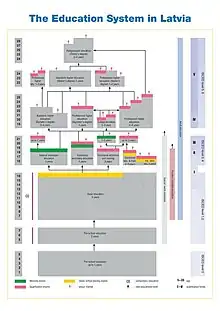
Education in Latvia is free and compulsory. Compulsory education includes two years of preschool education (usually starting at five years old) and a further nine years of primary education (usually until 15/16 years of age).[1][2]
In 1996, the gross primary enrollment rate was 95.8 percent, while the net primary enrollment rate was 89.5 percent.[3] The number of children who do not attend primary school was increasing as of 2001.[3] In rural areas, a number of schools have been closed.[3] The place allocated to minority languages in secondary education after the 2004 minority school transfer to bilingual education (60% in Latvian and 40% in the minority language) was an issue of protests in 2003–2004 and was opposed by Headquarters for the Protection of Russian Schools and Association in Support of Russian Language Schools.[4][5]
According to 2010 data from UNESCO, 4,720 students from Latvia were enrolled in tertiary education abroad (mostly in the UK, Russia and Germany); 1,760 students from other countries were enrolled in tertiary education in Latvia (mostly from Russia, Ukraine and Lithuania).[6]
See also
References
- ↑ "Compulsory Education in Europe" (PDF).
- ↑ "Education system – Study in Latvia – studyinlatvia.eu". www.studyinlatvia.eu.
- 1 2 3 "Latvia" Archived 2008-04-21 at the Wayback Machine. Findings on the Worst Forms of Child Labor (2001). Bureau of International Labor Affairs, U.S. Department of Labor (2002). This article incorporates text from this source, which is in the public domain.
- ↑ Eglitis, Aaron (11 September 2003). "Protesters rally against education reform". The Baltic Times. Retrieved 24 June 2008.
- ↑ Eglitis, Aaron (29 January 2004). "School reform amendment sparks outrage". The Baltic Times. Retrieved 24 June 2008.
- ↑ "UNESCO UIS". www.uis.unesco.org.
External links
- Ministry of Education and Science
- Information on education in Latvia, OECD – Contains indicators and information about Latvia and how it compares to other OECD and non-OECD countries
.svg.png.webp)